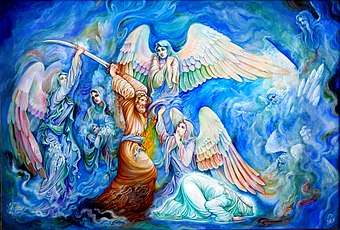Ramadan (calendar month)
The month of Ramadan (Arabic: رَمَضَان, Ramaḍān), also spelled Ramadhan or Ramazan, is the ninth month of the Islamic calendar, and the month in which the Quran was revealed to the Islamic prophet Muhammad.
| Islamic calendar |
|---|
| Months |
Fasting during the month of Ramadan is one of the Five Pillars of Islam. The month is spent by Muslims fasting during the daylight hours from dawn to sunset. According to Islam, the Quran was sent down to the lowest heaven during this month, thus being prepared for gradual revelation by Jibreel to Muhammad. Therefore, Muhammad told his followers that the gates of Heaven would be open for the entire month and the gates of Hell (Jahannam) would be closed.[1] The first day of the next month, Shawwal, is spent in celebration and is observed as the "Festival of Breaking Fast" or Eid al-Fitr.
Timing
The Islamic calendar is a lunar one: months begin when the first crescent of a new moon is sighted. Consequently, the Islamic year is 10 to 11 days shorter than the solar year and contains no intercalation,[lower-alpha 1] Ramadan migrates throughout the seasons. The Islamic day starts after sunset. The estimated start and end dates for Ramadan, based on the Umm al-Qura calendar[2] of Saudi Arabia, are:[3]
| AH | First day (CE/AD) | Last day (CE/AD) |
|---|---|---|
| 1439 | 17 May 2018 | 14 June 2018 |
| 1440 | 6 May 2019 | 3 June 2019 |
| 1441 | 24 April 2020 | 23 May 2020 |
| 1442 | 13 April 2021 | 12 May 2021 |
| 1443 | 2 April 2022 | 1 May 2022 |
| 1444 | 23 March 2023 | 20 April 2023 |
.jpg)
Many Muslims insist on the local physical sighting of the moon to mark the beginning of Ramadan, but others use the calculated time of the new moon or the Saudi Arabian declaration to determine the start of the month. Since the new moon is not in the same state at the same time globally, the beginning and ending dates of Ramadan depend on what lunar sightings are received in each respective location. As a result, Ramadan dates vary in different countries, but usually only by a day. This is due to the cycle of the moon. The moon travels the same path all year round and when the moon is seen in the east, it is then seen traveling towards the west. All the countries around the world see the moon within a 24-hour period once spotted by one country in the east.[4] Astronomical projections that approximate the start of Ramadan are available.[5]
Events

Ramadan is observed by Muslims during the entire lunar month by the same name. The month of religious observances consists of fasting and extra prayers. Some important historical events during this month are generally believed to include:
- 1 Ramadan, birth of Abdul Qadir Gilani
- 2 Ramadan, the Torah was bestowed on Moses according to Islam
- 10 Ramadan, death of Khadija bint Khuwaylid, first wife of Muhammad
- 10 Ramadan, in 1973, Operation Badr took place, starting the Yom Kippur War
- 12 Ramadan, the Gospel was bestowed on Jesus according to Islam
- 15 Ramadan, birth of Hasan ibn Ali
- 15 Ramadan, during the Ottoman Empire, the Sultan presented trays of baklava to the Janissaries in a ceremonial procession called the Baklava Alayı
- 17 Ramadan, birth of Ibn ʿArabi
- 17 Ramadan, death of Aisha bint Abu Bakr – third wife of Muhammad
- 17 Ramadan, death of Ruqayyah daughter of Muhammad and Khadija, wife of Uthman
- 17 Ramadan, the Battle of Badr was won by the Muslims
- 18 Ramadan, the Psalms (Zabur) were bestowed on David (Dawood)
- 19 Ramadan, Rashidun Caliph Ali was struck on the head by a sword by an assassin while praying
- 20 Ramadan, the Conquest of Mecca by Muhammad
- 21 Ramadan, Caliph Ali died due to his injuries
- 27 Ramadan, the Dominion of Pakistan was established on 14 August 1947 (27 Ramadan 1366 in the Islamic calendar)[6]
Laylat al-Qadr is observed during one of the last ten days of the month (typically the odd nights). Muslims believe that this night which is also known as "The Night of Power" is better than a thousand months. This is often interpreted as praying throughout this night is rewarded equally with praying for a thousand months (just over 83 years i.e., a lifetime). Many Muslims spend the entire night in prayer.
Hadith
Prohibition to pronounce the word Ramadan by itself
According to numerous hadiths, Ramadan is one of the names of God in Islam, and as such it is prohibited to say only "Ramadan" in reference to the calendar month and that it is necessary to say the "month of Ramadan".
Sunni
The Messenger of God (sa) said: Do not say "Ramadan", for verily Ramadan is a name from the names of Allah, rather say "month of Ramadan".[7]
He (the Prophet Muhammad) hated them saying "Ramadan", and he said: "Because it is a name from the names of Allah. Rather we say just as Allah said [in the Quran] – the "month of Ramadan".[8]
The Prophet (sa) said: Do not say "Ramadan has come" or "Ramadan has finished", for verily Ramadan is a name from the names of Allah, the Lofty.[9]
The Messenger of God (sa) said: Do not just say "Ramadan", for verily Ramadan is the name of Allah, rather say "month of Ramadan".[10]
Ibn Abu Hurairah reported: Do not say "Ramadan", for verily Ramadan is a name from the names of Allah, rather say "month of Ramadan".[11]
The Messenger of God (sa) said: Not a single one of you should be saying "I fasted Ramadan", nor "I establish [the Salah] in Ramadan", nor "I produced in Ramadan such-and-such", for verily Ramadan is a name from the names of Allah, Prestigious and Majestic is His greatness. Rather say "month of Ramadan" just as your Lord, Prestigious and Majestic, has said in His book (i.e. the Quran).[12]
Aisha asked: "O Messenger of God, what is the meaning of 'Ramadan'?" So the Messenger of God (sa) said: "O Humayra', do no say "Ramadan" for verily Ramadan is a name from the names of Allah, rather say "month of Ramadan". The meaning of the word 'Ramadan"' is that [Allah] burns in his month the sins of His worshippers, meaning he forgives them."[13]
Shia
Muhammad al-Baqir (as) said: Do not say "this Ramadan", nor "Ramadan has gone", nor "Ramadan has come", for verily Ramadan is a name from the names of Allah, Prestigious and Majestic. He does not come nor leave, for the coming and leaving is for a thing that is not everlasting. Rather say "month of Ramadan", for the word 'month' is a genitive for the noun, and the noun is the name of Allah, Prestigious and Majestic.[14][15][16][17]
Ali (as) said: Do not say "Ramadan", rather say "month of Ramadan" for verily you don’t know what Ramadan is.[18][19][20][21]
Ali (as) said: Do not say "Ramadan" for verily you don’t know what Ramadan is. So the one who says that (just 'Ramadan'), then let him give alms in charity and he should fast as an atonement for his blasphemy. Rather say as Allah, Prestigious and Majestic, has said: "month of Ramadan".[22][23][24][25]
Zaydi
Ali (as) said: Do not say "Ramadan" for verily you don’t know what Ramadan is. So the one who says that (just 'Ramadan'), then let him give alms in charity and he should fast as an atonement for his blasphemy. Rather say as Allah, Prestigious and Majestic, has said: "month of Ramadan".[26]
See also
Notes
- A tropical year is almost the same length as a year in the Western Gregorian Calendar, the difference is imperceptible in a human lifespan.
References
- Hadith al-Bukhari 3:123 Hadith Collection
- Ramadan Calendar, Hamariweb
- Umm al-Qura calendar of Saudi Arabia
- "What is the Islamic calendar?". FAQ - For Muslims. Ramadan Awareness Campaign.
- "Ramadan and Eidian". Committee For Crescent Observation. Retrieved 7 August 2012.
- http://www.pakistan.gov.pk Archived 2006-01-27 at the Wayback Machine
- Al-Bayhaqi, Abu Bakr. Sunnan al-Kubra (in Arabic). p. Vol. 4, Book 11, Ch. 6, Nu. 7904.
قَالَ رَسُولُ اللَّٰهِ صَلَّىٰ اللَّٰهُ عَلَيْهِ وَسَلَّمَ: لَا تَقُولُوا۟ «رَمَضَانُ» فَإِنَّ رَمَضَانَ اسْمٌ مِنْ أَسْمَاءِ اللَّٰهِ وَلَٰكِنْ قُولُوا۟ «شَهْرُ رَمَضَانَ»
- Al-Tabari, Muhammad ibn Jarir. Tafsir al-Tabari (in Arabic). p. Vol. 3, Pg. 187.
أَنَّهُ كَرِهَ أَنْ يُقَالُ «رَمَضَانَ»، وَيَقُولُ: لَعَلَّهُ اسْمٌ مِنْ أَسْمَاءِ اللَّٰهِ، لَٰكِنَّ نَقُولُ كَمَا قَالَ اللَّٰهُ: «شَهْرُ رَمَضَانَ»
- Al-Razi, Fakhr al-Din. Tafsir al-Kabir (in Arabic). p. Vol. 5, Pg. 251.
عَنِ النَّبِيِّ صَلَّىٰ اللَّٰهُ عَلَيْهِ وَسَلَّمَ أَنَّهُ قَالَ: لَا تَقُولُوا۟ «جَاءَ رَمَضَانُ» وَ«ذَهَبَ رَمَضَانُ» وَلَٰكِنْ قُولُوا۟ «جَاءَ شَهْرُ رَمَضَانَ» وَ«ذَهَبَ شَهْرُ رَمَضَانَ» فَإِنَّ رَمَضَانَ اسْمٌ مِنْ أَسْمَاءِ اللَّٰهِ تَعَالَىٰ.
- Ibn al-Jawzi, Abdul Rahman. Al-Mawdu'at (in Arabic). p. Vol. 2, Pg. 187.
قَالَ رَسُولُ اللَّٰهِ صَلَّىٰ اللَّٰهُ عَلَيْهِ وَسَلَّمَ: لَا تَقُولُوا۟ «رَمَضَانُ» فَإِنَّ رَمَضَانَ اسْمُ اللَّٰهِ، وَلَٰكِنْ قُولُوا۟ «شَهْرُ رَمَضَانَ»
- Ibn Abu Hatim, Abdul Rahman. Tafsir Ibn Abu Hatim (in Arabic). p. Vol. 1, Pg. 310, Nu. 1648.
لَا تَقُولُوا۟ «رَمَضَانُ»، فَإِنَّ رَمَضَانَ اسْمٌ مِنْ أَسْمَاءِ اللَّٰهِ، وَلَٰكِنْ قُولُوا۟ «شَهْرُ رَمَضَانَ»
- Al-Dimashqi, Tamam. Fawa'id al-Tamam (in Arabic). p. Vol. 1, Pg. 104, Nu. 241.
قَالَ رَسُولُ اللَّٰهِ صَلَّىٰ اللَّٰهُ عَلَيْهِ وَسَلَّمَ: لَا يَقُولَنَّ أَحَدُكُمْ «صُمْتُ رَمَضَانَ»، وَ«قُمْتُ رَمَضَانَ»، وَلَا «صَنَعْتُ فِي رَمَضَانَ كَذَا وَكَذَا»، فَإِنَّ رَمَضَانَ اسْمٌ مِنْ أَسْمَاءِ اللَّٰهِ عَزَّ وَجَلَّ الْعِظَامِ، وَلَٰكِنْ قُولُوا۟ «شَهْرُ رَمَضَانَ» كَمَا قَالَ رَبُّكُمْ عَزَّ وَجَلَّ فِي كِتَابِهِ
- Ibn al-Saqri, Abu Tahir. Mashyakhah (in Arabic). p. Vol. 1, Pg. 126, Nu. 52.
عَائِشَةَ رَضِيَ اللَّٰهُ عَنْهَا قَالَتْ قُلْتُ يَا رَسُولَ اللَّٰهِ مَا مَعْنَىٰ رَمَضَانَ فَقَالَ رَسُولُ اللَّٰهِ صَلَّىٰ اللَّٰهُ عَلَيْهِ وَسَلَّمَ: يَا حُمَيْرَاءُ لَا تَقُولِي «رَمَضَانُ» فَإِنَّهُ اسْمٌ مِنْ أَسْمَاءِ اللَّٰهِ وَلَٰكِنْ قُولِي «شَهْرُ رَمَضَانَ» يَعْنِي رَمَضَانَ أَرْمَضَ فِيهِ ذُنُوبَ عِبَادِهِ فَغَفَرَهَا
- Al-Kulayni, Muhammad ibn Ya'qub. Al-Kafi (in Arabic). p. Book 14 (the Book of Fasting), Ch. 4, Hadith 2, Nu. 6281.
قَالَ أَبُو جَعْفَرٍ (عَلَيْهِ السَّلَامُ): لَا تَقُولُوا۟ «هَٰذَا رَمَضَانُ» وَلَا «ذَهَبَ رَمَضَانُ» وَلَا «جَاءَ رَمَضَانُ» فَإِنَّ رَمَضَانَ اسْمٌ مِنْ أَسْمَاءِ اللَّٰهِ عَزَّ وَجَلَّ لَا يَجِيءُ وَلَا يَذْهَبُ وَإِنَّمَا يَجِيءُ وَيَذْهَبُ الزَّائِلُ وَلَٰكِنْ قُولُوا۟ «شَهْرُ رَمَضَانَ» فَإِنَّ الشَّهْرَ مُضَافٌ إِلَىٰ الْاسْمِ وَالاسْمُ اسْمُ اللَّٰهِ عَزَّ وَجَلَّ
- Ibn Babawayh, al-Saduq. Man La Yahduruhu al-Faqih (in Arabic). p. Vol. 2, Pg. 182, Nu. 2050.
- Al-Hurr Al-Amili, Muhammad. Wasa'il al-Shia (in Arabic). p. Vol. 10, Ch. 19, Hadith 2, Nu. 13505.
- Al-Majlisi, Muhammad-Baqir. Bihar al-Anwar (in Arabic). p. Vol. 93, Ch. 48, Hadith 1.
- Al-Kulayni, Muhammad ibn Ya'qub. Al-Kafi (in Arabic). p. Book 14 (the Book of Fasting), Ch. 4, Hadith 1, Nu. 6280.
قَالَ أَمِيرُ الْمُؤْمِنِينَ (عَلَيْهِ السَّلَامُ): لَا تَقُولُوا۟ «رَمَضَانُ» وَلَٰكِنْ قُولُوا۟ «شَهْرُ رَمَضَانَ» فَإِنَّكُمْ لَا تَدْرُونَ مَا رَمَضَانُ
- Ibn Babawayh, al-Saduq. Man La Yahduruhu al-Faqih (in Arabic). p. Vol. 2, Pg. 182, Nu. 2051.
- Al-Hurr Al-Amili, Muhammad. Wasa'il al-Shia (in Arabic). p. Vol. 10, Ch. 19, Hadith 1, Nu. 13504.
- Al-Majlisi, Muhammad-Baqir. Bihar al-Anwar (in Arabic). p. Vol. 93, Ch. 48, Hadith 2.
- Ibn Tawus, Sayyid. Al-Iqbal Bil-Amal (in Arabic). p. Vol. 1, Pg. 29.
عَلِيٍّ (عَلَيْهِ السَّلَامُ) قَالَ: لَا تَقُولُوا۟ «رَمَضَانُ» فَإِنَّكُمْ لَا تَدْرُونَ مَا رَمَضَانُ فَمَنْ قَالَهُ فَلْيَتَصَدَّقْ وَلْيَصُمْ كَفَّارَهً لِقَوْلِهِ وَلَٰكِنْ قُولُوا۟ كَمَا قَالَ اللَّٰهُ عَزَّ وَجَلَّ «شَهْرُ رَمَضَانَ»
- Al-Hurr Al-Amili, Muhammad. Wasa'il al-Shia (in Arabic). p. Vol. 10, Ch. 19, Hadith 3, Nu. 13506.
- Al-Majlisi, Muhammad-Baqir. Bihar al-Anwar (in Arabic). p. Vol. 93, Ch. 48, Hadith 3.
- Al-Nouri Al-Tabarsi, Husayn. Mustadrak al-Wasa'il (in Arabic). p. Vol. 7, Ch. 12, Hadith 1, Nu. 8609.
- Al-Shajari, Yahya bin Hussein. Al-Amali Al-Khamisiyah (in Arabic). p. Vol. 1, Pg. 380, Nu. 1355.
أَنَّ عَلِيًّا عَلَيْهِ السَّلَامُ كَانَ يَقُولُ: لَا تَقُولُوا۟ «رَمَضَانُ» فَإِنَّكُمْ لَا تَدْرُونَ مَا رَمَضَانُ فَمَنْ قَالَهُ فَلْيَتَصَدَّقْ وَلْيَصُمْ كَفَّارَةً لِقَوْلِهِ، وَلَٰكِنْ قُولُوا۟ كَمَا قَالَ اللَّٰهُ عَزَّ وَجَلَّ: «شَهْرُ رَمَضَانَ»
